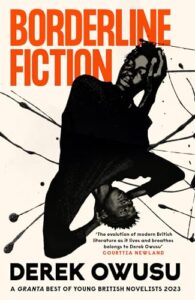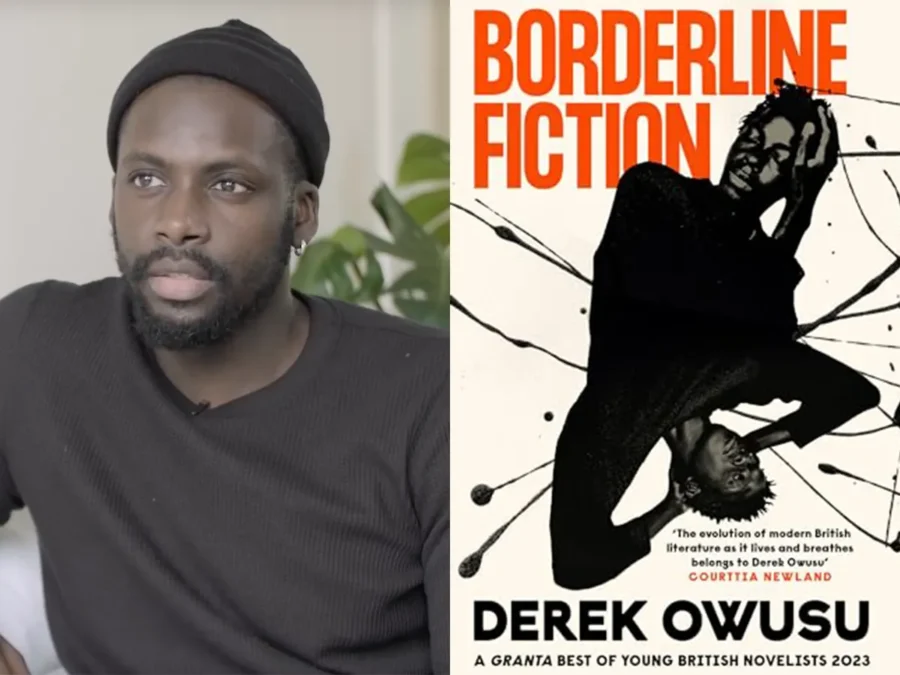I wanted to like this novel, but I couldn’t. Here’s why.
I found a lot to admire in Borderline Fiction, the new novel by Derek Owusu, but not a lot to love.
The novel consists of alternating chapters labelled “Twenty-Five” and “Nineteen”, and we follow the same character, Marcus, falling in love at each age. Can he learn from his earlier mistakes and make things work the second time around?
The title seems to have a double meaning. “Borderline” refers to Borderline Personality Disorder (BPD), which another character in the novel refers to. Marcus is taking medication for his mental health, and although it’s never specified, he seems to fit the description of BPD: unstable interpersonal relationships, acute fear of abandonment, intense emotional outbursts, self-harming behaviours, risky activities, dissociation, a pervasive sense of emptiness, and a distorted sense of self.
Borderline Fiction could also indicate that this book inhabits the borders between fiction and memoir. Owusu has spoken about his own BPD diagnosis in the past, and he also shares some characteristics and life experiences with the characters of Marcus, like being raised in foster care in East Anglia, working as a personal trainer in a gym, etc.

I liked the premise of a novel featuring BPD, something I knew nothing about before reading this. I’d heard the name before but was never sure what it meant, so I learnt a lot by following Marcus’s life at both ages and seeing the impact of BPD on his life and relationships.
I also liked reading a novel in which British-Ghanaian culture is at the centre. Both Marcus and the women he falls in love with are from that background, and it’s not a perspective you see too much in fiction. It’s reflected in the food, the culture, the conflicts with the older generation, and in the language: both the interspersing of often untranslated Twi phrases and the London lingo: “handing out leaflets in ends, taking man’s numbers, belling them and asking if they thought they’d go heaven.”
Some of the writing is beautiful, but it also tends to pack in a lot of different images that don’t always seem to fit. Here’s the opening paragraph, to give you an idea:
So, yes, I was in love again, losing balance, stumbling towards an earlier phase of my life. It was a moment I thought I knew, one I thought I could distinguish from my grazed and swollen knuckles as I fought back vertigo, the peak of a desert where a person became a thing.
It’s quite poetic, but what exactly is the peak of a desert where a person became a thing? It’s hard to visualise, especially since it later turns out Marcus is at a speed dating event in London. Vertigo is a familiar way of describing the feeling of falling in love, but what comes afterwards just makes it harder to situate the scene. The grazed and swollen knuckles are explained later on, if you’re paying enough attention: Marcus used to bite the skin of his knuckles, so it’s a powerful way of showing the character’s anxiety.
At other times, the poetic language disappears, and we just get pages and pages of dull and repetitive dialogue or circular arguments, with no attribution or quote marks, so that it’s difficult to follow who’s saying what.
Something told me you were hiding shit from me.
Something told you?
Yeah?
Like what?
I don’t fucking know, I just know when someone is doing me dirty, something just tells me.
Really? Something like what? Anansi?
Are you fucking dumb? Why you chatting shit? What the fuck, man?
That’s a tiny sample from a much longer argument. Then, a few pages later, we get:
What are you cooking?
Oxtail. With plantain and rice.
Just for you, yeah?
Marcus, when have I ever cooked just for me?
Oh, so for you and Michael, then?
Michael?
Yes, Michael.
Michael?
Yes, man, don’t try act dumb now. I swear, just cos man aint out here like my cousins don’t think I’m some prick.
Michael. You’re pissed off because I’ve been talking to Michael?
Again, it goes on. These arguments do serve a purpose in showing Marcus’s paranoia and inability to form relationships, but pages and pages of “Michael? Yes, Michael. Michael? Yes, Michael” add up to a tough read.
There’s lots of drug use, lots of sex, lots of partying, but it all feels achingly empty. Which, if you look back at the characteristics of BPD, is probably the point, but again, it doesn’t make for a good read. There is also quite a bit of emotional vulnerability and yearning for connection, which is when the character gets more interesting, but then the paranoia and self-destruction take over again.
Then we have the issue of spending an entire novel inside the head of someone with Borderline Personality Disorder. This is why I return to the line I started this post with: I found a lot to admire but not a lot to love. It’s worthwhile to see life through the eyes of someone with BPD, but it’s not very enjoyable. I found myself losing focus, forgetting which timeline I was in, and often not particularly caring what happened in either of them. Borderline Fiction was an interesting read, but not one I can honestly recommend. It was too uneven for me, too repetitive, too meandering.
I may well be wrong about this book, though. Courttia Newland, who I met in Barbados years ago and whose opinion I respect, said:
“The evolution of modern British literature as it lives and breathes belongs to Derek Owusu … With this novel, Owusu doubles down on everything that makes his fiction so exemplary. There are passages that took my breath away. The world, the dialect, the ideas, are all glaringly fresh and true.”
Owusu is also one of Granta’s “Best of Young British Novelists” and seems to be unanimously praised by everybody in the literary world. So Borderline Fiction will probably make me look stupid by going on to win the Booker.




There are 8 comments
Every book its reader. Some books and some readers just don’t mesh no matter what and that’s ok!
Thanks for the mention in your newsletter btw!
You’re welcome, Stefanie! And thanks – yes, I think Borderline Fiction will find plenty of readers to mesh with. I think I’m just surprised when I read a book that ticks all the boxes of the kind of thing I like to read, but still doesn’t work for me. But that happens sometimes, doesn’t it? Part of the fun and unpredictability of the reading experience.
Um. Reading your thoughts and the quotes, I think I’m with you rather than Newland. I don’t think I would gel with this one at all!
No, I don’t think you’d like this one! To be fair to Owusu, I probably didn’t pick the best quotes from the book, but still.
I love your last line. Books I don’t care for that win prizes. ¯\_(?)_/¯
Yes, it happens quite a bit, as I know you experienced recently with Milkman 🙂
I enjoyed reading your review more than you enjoyed reading the book. I’m glad you shared so many quotes and wrote about your responses along the way. And I think your statement about it not being a “good read” is important, because, given the bit of the author’s biography you’ve shared, it doesn’t suggest he intended his book to be a “good read”?
He seems more likely he wanted to share something about how one figure experiences the world through the prism of a BPD diagnosis, and it seems like that would be an uncomfortable place to exist? And, if that’s true, maybe the question of whether prose is repetitive or meandering just isn’t the question to ask? If his intent was to depict an authentic experience, wouldn’t being less repetitive and more structured be inauthentic?
Of course, I have no idea as to his intent, but I feel like I’ve crawled through this thought process frequently while reading through the lens of fragmented worldviews (various diagnoses or moments of crises or wartime) and grappled with the question of whether a story has an obligation to make us feel good/better. Can we value a book we respect as much as a book we love.
Good point! I definitely don’t think a story has an obligation to make us feel good/better. I’m all for a difficult and challenging reading experience that shows me what life looks like from a very different perspective. Milkman by Anna Burns and C by Tom McCarthy are a couple of examples that come to mind, where the narrative was fractured and difficult to follow, but I enjoyed the reading experience. The difficulty was worth it. And Dostoevsky’s The Gentle Spirit was written from inside the disordered mind of a deeply sick character who’d just driven his wife to suicide, but again, it worked for me.
On reflection, “good read” probably wasn’t the right phrase. I don’t think Owusu needed to smooth out his narrative or make it inauthentic. I do think there could have been a way of showing the authentic experience of a character with BPD in a more successful way.
Thanks for your points, which prompted me to think about what I meant and get a bit clearer on it!